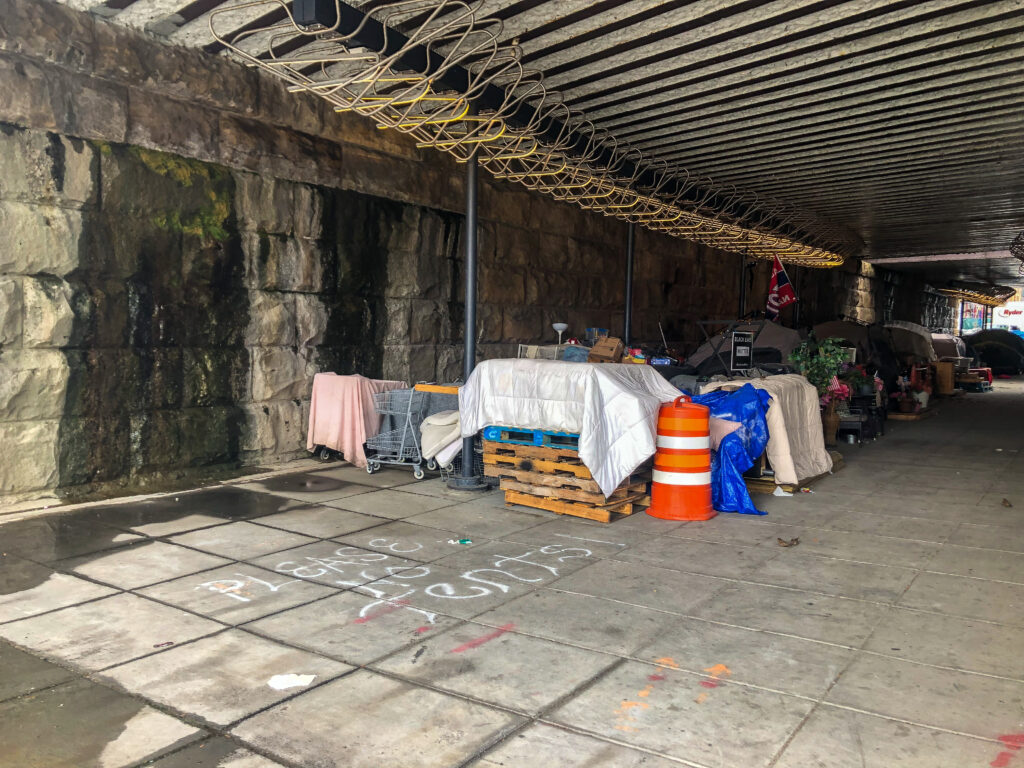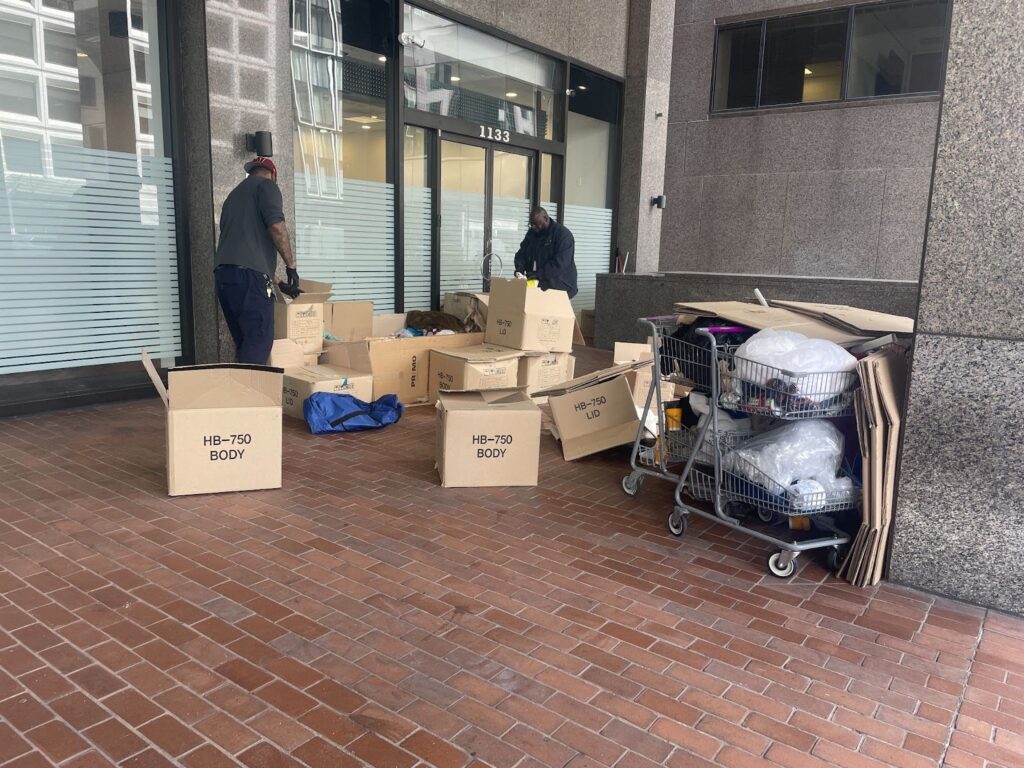Mama J has been living at the NoMa encampments since 2012. She said she has met everyone who lives there, and says she’s comfortable.
In less than two weeks, D.C. plans to permanently bar Mama J, and all other people from living on two District sidewalks. Approximately 50 people live there.
“I don’t know where I’m going. I’m going to be pushing a cart around on the street. I don’t got no place to go. But that don’t mean I’m going to sell into them. I’m not,” Mama J said. She declined to give her legal name.
The encampments — which include the L Street NE and M Street NE underpasses near Union Station — are being shut down as part of a D.C. pilot program.
Deputy Mayor for Health and Human Services Wayne Turnage said the pilot focuses on providing housing to people living in encampments and that D.C. government determined the NoMa gatherings pose a threat to public safety and health. The pilot also includes an encampment at E Street NW in Foggy Bottom and an encampment in a park near New Jersey Avenue NW.
D.C. is promising to offer all of the encampment residents the chance to receive a permanent supportive housing voucher (PSH). However, the city acknowledges some people may not be eligible and some may refuse it.
Jessica Smith, DMHHS Deputy Chief of Staff explained that some residents may be more or less receptive to help depending on the day. The District’s greatest estimate of individuals refusing housing was less than five, as of Sept. 13. Those who don’t accept the voucher will be forced to move elsewhere.
What will happen on Oct. 4?
On Oct. 4, D.C. will remove any property not stored or moved from the underpasses by 10 a.m., according to a posted notice.
Anyone can request free storage of their property 30 minutes before the scheduled time as long as the property is not “perishable, soiled, wet, infested, illegal, or unsafe or dangerous to handle,” the notice said. The District will provide each resident with up to two 40-gallon containers for storage.
Property left on site during the cleanup may be removed and immediately disposed of, the notice said. D.C. will store “items of obvious value” if they are in plain sight, including medications, working electronics, or important documents such as IDs or financial records. However, cleanup crews may not be able to find these items, so they could be thrown away.
After the cleanup, the areas will become “pedestrian passageways,” according to a separate posted notice. Any items left blocking the sidewalk in the underpasses could be immediately removed and thrown away.
What resources do residents have?
The goal is to have everybody at the encampments move into housing, Turnage said.
The District is offering residents the opportunity to move into non-congregate housing, rather than shelters. The significant majority of individuals D.C. has encountered at the encampments are eligible for PSH, Turnage said. That program provides permanent housing and social services to recipients for as long as they need it.
To qualify for PSH, an individual or family must have a “disabling condition” and have been continuously unhoused for a year or have had four or more episodes of homelessness in the past three years. If someone doesn’t qualify, Turnage said the District will find them other housing resources.
For those who don’t accept housing, Turnage said there’s nothing the District can do about that. “The government … has no vehicle to force someone to participate in a program of public benefits. So if a person decides they don’t want to participate and accept housing, that is their right,” Turnage said.
Maurice Cook, executive director of Serve Your City D.C. and lead organizer of Ward 6 Mutual Aid, questioned what the District is willing to do to people who refuse the offer for housing.
“Is it illegal to survive on the street? … Is it moral to use law enforcement to manage whose presence? Who is demanding that this woman (Mama J) leave and find somewhere else to go?” Cook said. “Because if you have a person who doesn’t have housing, that doesn’t trust the system to guarantee them housing, whose mandate is it to do what?”
Why is this happening now?
The District chose the city’s three largest encampments to test out the encampment clearing model, Turnage said.
“The encampments along M Street and L Street have proliferated in numbers such to the point that it is difficult for people to negotiate those underpasses, and it also puts the residents at risk of harm in crowded underpasses,” Turnage said.
D.C. has received complaints about New Jersey and O Street NW that reflect public safety and health issues, Turnage said. Those complaints influence the District’s decisions to clear some areas over others.
Housed residents also complained to the District about another large encampment at the K Street underpass in NoMa late 2019. It was shut down in January 2020 and served as the first implementation of the city’s pedestrian passageway policy.
The complaints were accompanied by an open letter from NoMa Business Improvement District’s now-former president, Robin-Eve Jasper. Washington City Paper reported that, after Jasper’s letter, more than 30 NoMa residents emailed complaints about the encampment to Ward 6 Councilmember Charles Allen and to Turnage.
“Encamped residents also said the letter was harsh, coming just days after someone was found dead in a nearby tent,” City Paper reported.
Starting January 2020, NoMa BID worked with The h3 Project to homeless people within the business improvement district. That’s according to Maura Brophy, current NoMa BID president and CEO. She replaced Jasper in February.
After the scheduled closure, the NoMa BID will continue to fund The h3 Project’s services for people who remain unhoused in the area.
“The NoMa BID is supportive of any and all efforts to house individuals and families experiencing homelessness in the District,” Brophy said about the District’s pilot program.
Allen’s office acknowledged Street Sense Media’s questions but did not respond before publication.
Drew Courtney, the ANC commissioner representing the area where the L Street and M Street encampments are, expressed support for D.C. finding encampment residents housing but disagreed with shutting down the tent communities.
“I strongly support efforts to increase outreach to encampments and to expedite housing for unhoused people. But that doesn’t mean we should be creating a no-tent zone in this location. This plan to create a no-tent zone hasn’t had sufficient public input and it shouldn’t be enacted at this time,” Courtney said in an email to Street Sense Media.
As for Cook of Serve Your City, he said he supports Mama J’s right to stay in place.
“I fully support her … right to stay in place. I support all Black peoples’ rights to stay in place in Washington, D.C.,” Cook said.
UPDATE (09.29.2021)
Dates in this article were updated to reflect a delay in the encampment closure to October 4, 2021.








